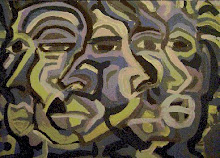 But from where does faith come?
But from where does faith come?What is it's practical application?
Does everyone have the ability to possess faith?
What is the difference between someone who fails and someone who succeeds?
Or really; What is the difference between someone who settles for a loss and someone who strives to make things better - even though both start out in the same hopeless situation?
Does one individual possess faith where the other does not?
Why can some people see beyond the immediate problem to the distant answer?
IMO - Racism doesn't hold segments of society back - a lack of faith does.
I live in an area that is 49% Black and 49% white - but racism is still cited as the cause of most of the town's social ills.
For generations, undereducated workers could make $130k yr at any of the many local refineries.
Our city government is run equally by Blacks and whites in all of the positions of real power.
Our school board is mostly Black and the superintendent makes $435k yr in a city of 113.000 people.
The city has two "Black" high schools and one white high school.
More money is spent per student at the Black high schools.
The housing is priced at one of the lowest rates in the country and the cost of living is embarrassing low.
Yet still - most Black families only enjoy one generation (if at all) of living outside of one of the many crime infested areas.
Even when the resources are available and visible power can be seen to be equally shared - one's race is often cited as the reason someone gets fired from their job, doesn't go on to college, or when one fails to better their life.
What I'm asking is - Are the people so used to being members of the lower class that they accept being lower class as their default position in life?
Do they see "lower class" as being the primary aspect of retaining their Blackness?
The most often stated reason for me doing 'aight and them suffering is that I must be smart.
But I'm not smart - I just passed the teats.
My father worked at an ad agency after his stint in the Air Force.
He died when I was a little over one year old but my mother kept his art studio fairly intact.
Some of my earliest memories are of me drawing with the tools of his trade.
But the thing is - I'm no artist.
I wouldn't draw things as I saw them in life - instead I would draw things the way my father had. (I would copy his studies of eyes, mouths, hands, etc. that I had found in one of his old sketch books.)
But since one of the first I.Q. tests given to a child is the Draw A Man test, I was deemed to be one of the smart kids.
I had one of those mothers who believed in passive parenting.
No, not that she was passive and failed to discipline us.
In fact, I think whooping us was one of the few joys in her life.
My mother wasn't one of those active parents who would check homework and make sure that the lessons were learned.
But do to the forced assimilation of her tribe as a child, my mother was a huge fan of: the proper conjugation of verbs, using proper tense, anything on PBS, and kids using proper etiquette.
I think I saw every episode of Sesame Street aired until I started pre-school.
When I was three, our town received funding for a head start program that was intended to help minority kids learn what was usually not taught in the home.
This program reinforced the lessons that my mom did bother to teach.
Since most of the children had siblings at the nearby school who were reading I See Sam books - we three and four years olds would read those same books
Since the second I.Q. test given to children is usually some sort of reading test, I passed that test too.
As I wrote earlier, I would often get nosebleeds during the dry and hot days that were common in my California desert town.
The teachers would cut my recess short and send me to the library.
I'd read National Geographic (good photographs and interesting stories), JAMA (to look for a reason behind my nosebleeds) and work ahead on my classwork.
Since the third grade I.Q. test is really the testing one's likelihood of assimilation into mainstream culture, I accidental acquired the knowledge that would help me to do very well on the tests.
In the third grade, I was officially diagnosed with "Gifted-ism".
When one is diagnosed with this malady, one is usually segregated from other children and put into special classrooms. (Or put two to a class in districts that believe in tokenism.)
The classes are generally filled with strange little children who find pleasure in making others feel inferior. (Which is actually fun because I liked the competition.)
One's teachers and parents are often ill equipped to deal with these precocious rug rats and generally let them run wild and excuse any bad behavior as them "expressing themselves".
The parents of these children often form support groups to arrange play dates. (Which were actually pretty fun. Since I lived in the hood at the time, this was my first exposure to better living. And if one happens to be a Black kid that is not picking on one of the better off white kids, so much the better - these parents kind of adopt you and take you on outings that you would probably miss in your daily life.)
Since I lived in a liberal town with more than adequate funding, the MGM (Mentally Gifted Minors) and GATE programs enabled us to take college classes from the seventh grade forward.
(Okay, actually it was one three hour class one night a week each lasting for one semester that was given at the local university.)
In taking these classes, we were given mentors and I.D. cards that allowed access to all of the university's facilities.
Why am I telling all this?
Because I'm not gifted. My I.Q. was acquired through exposure to subjects starting at an early age.
If I, a kid originally from the hood and with very few resources within the family, could develop marketable skills... anyone can.
But what my passed experiences taught me was that any problem can be solved and any obstacle overcome.
I didn't have parents who could help me with my classwork - instead, they assumed that I was smart enough to figure everything out and do everything on my own.
I was a stepson to a drug using, country raised, military disciplined man who had no problem beating us in his drug induced rages.
I was the son to a mother who would leave home for three to four months at a time or take us to live in motels or at the homes of her friends. (Once even at the Salvation Army.)
But what makes some believe that things can be better and drives them to make this so?
What I'm asking is; even where there should be no faith - what makes faith possible?
Is faith learned?














4 comments:
I think you have faith or you don't. I guess that is why people are told to think positive all the time.
I like this post! We have a lot in common especially key points where all of a sudden you were accepted as smart. I tell many people that I am not that smart of a guy but I do believe things will work in my favor.
I often ask myself where did that come from? My mother believes I am a old soul like a lot of Black folk when they see someone who puts 2 and 2 together. I too watched all the sesame streets, Wild Wild Africa, had college prep classes at a young age and experienced life in flashes outside of Compton. I didn't have a hands on mother she worked all day so I did my homework by myself. The best she ever helped me was to repeat it and then somehow because she said it it made sense to me. Shit man I only got a 710 on my SAT but I had a 3.5 in high school. I almost got kicked out of Law school because I had a D average my first semester, but I stayed and got a B+ average the next one.
I've overcome more horrible shit than most before I turned 15 and all the while I never really knew it was bad til I looked back.
So to answer your question faith is learned. Somewhere at a early age I got the backing of a lot of people that I was smart. That backing kept me going til this day because in the back of my mind I think I will figure it out. In the back of my mind I believe I am smart enough.
This is why I believe we need our own schools because that feeling of being special can come from a teacher. Faith is learned but because you were so young when you were taught it you grow up and think it just came from deep inside of you or by some spiritual awakening.
@ Anon - But 'thinking' and 'knowing' are two different things.
The same could be said of 'thinking' and 'believing'.
I was thinking that since "intellegence" could be learned - the same must be true of knowledge and then faith.
And since faith is required to take the next step - maybe this is the missing link in solving the problems of the hood.
@ FreeMan - I think a lot of people have been through some ish in their childhood and never realized that it was that bad.
But why do some view "not that bad" as a stepping stone while others view it as a way of life?
The more I try to help people the more I realize that many just choose that type of lifestyle. Many just settle for what is given them.
They always say that the odds of making it out of a bad situation are a million to one.
But in reality, it's more like one thousand to one.
And since only one percent are even going to make the effort and sacrifice - the odds are really only ten to one.
But everytime one fails and tries again, those odds get reduced to something closer to 50/50.
It seems that the best answer is to make the best effort possible with the understanding that eventually you will succeed.
Unfortunately - only a few make this effort.
"It seems that the best answer is to make the best effort possible with the understanding that eventually you will succeed."
Yes, because you just don't know what will happen when you try but you always know what will happen if you don't!
Post a Comment